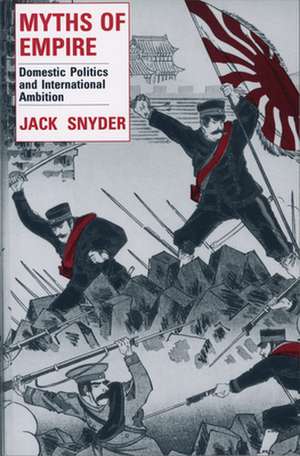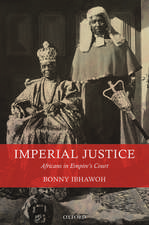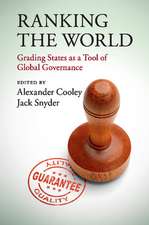Myths of Empire – Domestic Politics and International Ambition: Cornell Studies in Security Affairs
Autor Jack Snyderen Limba Engleză Paperback – 27 mar 1993
Overextension is the common pitfall of empires. Why does it occur? What are the forces that cause the great powers of the industrial era to pursue aggressive foreign policies? Jack Snyder identifies recurrent myths of empire, describes the varieties of overextension to which they lead, and criticizes the traditional explanations offered by historians and political scientists.He tests three competing theories--realism, misperception, and domestic coalition politics--against five detailed case studies: early twentieth-century Germany, Japan in the interwar period, Great Britain in the Victorian era, the Soviet Union after World War II, and the United States during the Cold War. The resulting insights run counter to much that has been written about these apparently familiar instances of empire building.
| Toate formatele și edițiile | Preț | Express |
|---|---|---|
| Paperback (1) | 262.40 lei 6-8 săpt. | |
| MB – Cornell University Press – 27 mar 1993 | 262.40 lei 6-8 săpt. | |
| Hardback (1) | 453.19 lei 6-8 săpt. | |
| MB – Cornell University Press – 16 sep 1991 | 453.19 lei 6-8 săpt. |
Din seria Cornell Studies in Security Affairs
-
 Preț: 254.66 lei
Preț: 254.66 lei -
 Preț: 287.01 lei
Preț: 287.01 lei -
 Preț: 115.88 lei
Preț: 115.88 lei -
 Preț: 155.47 lei
Preț: 155.47 lei -
 Preț: 248.19 lei
Preț: 248.19 lei -
 Preț: 163.94 lei
Preț: 163.94 lei -
 Preț: 141.33 lei
Preț: 141.33 lei -
 Preț: 116.92 lei
Preț: 116.92 lei -
 Preț: 147.82 lei
Preț: 147.82 lei -
 Preț: 140.64 lei
Preț: 140.64 lei -
 Preț: 145.90 lei
Preț: 145.90 lei -
 Preț: 159.62 lei
Preț: 159.62 lei -
 Preț: 147.84 lei
Preț: 147.84 lei -
 Preț: 154.39 lei
Preț: 154.39 lei -
 Preț: 136.31 lei
Preț: 136.31 lei -
 Preț: 121.64 lei
Preț: 121.64 lei -
 Preț: 215.06 lei
Preț: 215.06 lei -
 Preț: 341.43 lei
Preț: 341.43 lei -
 Preț: 166.80 lei
Preț: 166.80 lei -
 Preț: 143.72 lei
Preț: 143.72 lei -
 Preț: 181.67 lei
Preț: 181.67 lei -
 Preț: 326.45 lei
Preț: 326.45 lei -
 Preț: 133.63 lei
Preț: 133.63 lei -
 Preț: 247.92 lei
Preț: 247.92 lei -
 Preț: 339.49 lei
Preț: 339.49 lei -
 Preț: 146.59 lei
Preț: 146.59 lei -
 Preț: 164.13 lei
Preț: 164.13 lei -
 Preț: 155.26 lei
Preț: 155.26 lei -
 Preț: 258.54 lei
Preț: 258.54 lei -
 Preț: 309.71 lei
Preț: 309.71 lei -
 Preț: 233.12 lei
Preț: 233.12 lei -
 Preț: 283.94 lei
Preț: 283.94 lei -
 Preț: 317.55 lei
Preț: 317.55 lei -
 Preț: 155.58 lei
Preț: 155.58 lei -
 Preț: 232.20 lei
Preț: 232.20 lei -
 Preț: 153.84 lei
Preț: 153.84 lei
Preț: 262.40 lei
Nou
50.21€ • 51.80$ • 41.90£
Carte tipărită la comandă
Livrare economică 27 martie-10 aprilie
Specificații
ISBN-10: 0801497647
Pagini: 344
Dimensiuni: 156 x 233 x 22 mm
Greutate: 0.45 kg
Ediția:Revised.
Editura: MB – Cornell University Press
Seria Cornell Studies in Security Affairs
Locul publicării:United States
Descriere
Overextension is the common pitfall of empires. Why does it occur? What are the forces that cause the great powers of the industrial era to pursue aggressive foreign policies? Jack Snyder identifies recurrent myths of empire, describes the varieties of overextension to which they lead, and criticizes the traditional explanations offered by historians and political scientists.He tests three competing theories--realism, misperception, and domestic coalition politics--against five detailed case studies: early twentieth-century Germany, Japan in the interwar period, Great Britain in the Victorian era, the Soviet Union after World War II, and the United States during the Cold War. The resulting insights run counter to much that has been written about these apparently familiar instances of empire building.




















